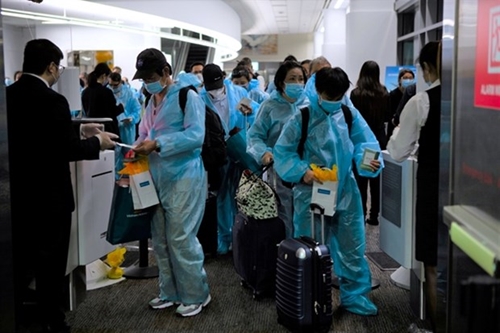The new regulations will be effective from January 1, 2022, the day Vietnam is set to resume regular international flights on a pilot basis.
    |
 |
|
Vietnamese nationals in masks and protective clothes board a direct flight from the US back to Vietnam in earlier December 2021. |
According to the guidance, the arrivals must have proof of negative COVID-19 test results (using the gold-standard PCR method) within 72 hours prior to entry (except in the case of children under two years old), must declare their health status before entry and must install Vietnam’s PC-COVID app (available on both Android and iOS) for contact tracing and medical declaration purposes. The installation of the app is only on a ‘recommended’ basis for diplomats and entrants on official businesses.
Arrivals that are Vietnamese citizens, including Vietnamese citizens residing overseas and the spouses and children of Vietnamese citizens, who have not been vaccinated against COVID-19, can be vaccinated for free during the quarantine period if they want to.
Entrants who have been fully vaccinated, or recovered from COVID-19, must not make direct contact with other people during the first three days, leave their places of residence or designated accommodation (hotels, motels, resorts, offices, dormitories, guest houses, etc.)
Two RT-PCR tests will be conducted, on the first and third day from the entry.
If the results return negative, then the entrants still need to self-monitor their health status for 14 days after arrival, but this is already a huge step down from the current policies of mandatory seven days of concentrated quarantine and seven days of follow-up medical self-observation.
If they are willing to get a COVID-19 test (RT-PCR) on the tenth day, then the medical self-observation could end then.
For entrants who have not been fully vaccinated, upon entry, they will stay at home or place of accommodation for seven days, with RT-PCR tests conducted on the first and seventh day.
If the results are negative, the full two weeks of self-observation is applied, with another RT-PCR test to be done on the fourteenth day from the entry.
For entrants who are under 18 years old, above 65 years old, pregnant women, or having underlying health conditions (without requiring care or observation of medical facilities), they could be quarantined along with their parents or caretakers.
The caretakers must be fully vaccinated or have recovered from COVID-19 and sign a ‘commitment’ document giving their voluntary willingness to quarantine with another person after having been informed of the risks of virus transmission. They will also be subject to the same stringent testing regimes and COVID-19 prevention and control measures expected of foreign arrivals.
During the self-observation period, the entrants must adhere to 5K message: Khau trang (face mask) – Khu khuan (disinfection) – Khoang cach (distance) – Khong tu tap (no gathering) – Khai bao y te (health declaration).
Anyone who develops suspect symptoms, like coughing, fever, breathing difficulties or throat ache, is urged to notify the local health authorities immediately.
The entrants are also recommended to have rapid antigen tests on the first day of entry and notify the health authorities if the result returns positive.
The verification and recognition of foreign COVID-19 vaccination certificates and recovery certificates are implemented following the guidance of the Ministry of Foreign Affairs, while the verification and recognition of Vietnam’s COVID-19 vaccination certificates and recovery certificates are implemented following the guidance of the Ministry of Health.
Vietnam has a high vaccination rate currently; 96.4 percent of the adult population has received at least one dose of COVID-19 vaccine while 76.5 percent are double vaccinated. Prime Minister Pham Minh Chinh has ordered health authorities to finish administering two doses of vaccines to 100 percent of the population aged 18 and above by the end of 2021 and accelerate the inoculation drive for children.
The protocols set in this guidance will replace relevant protocols set in previous guidance related to concentrated quarantine, and further changes to the quarantine period could be made depending on COVID-19 pandemic developments, according to the Ministry of Health.
The protocols are not applicable to all entrants who have arrived into Vietnam and are already within the periods of quarantine and medical self-observation before the issuance date (December 16, 2021).
The proposed new rules were first made public by the Ministry of Health just this morning before becoming official later on the day.
Source: VNA